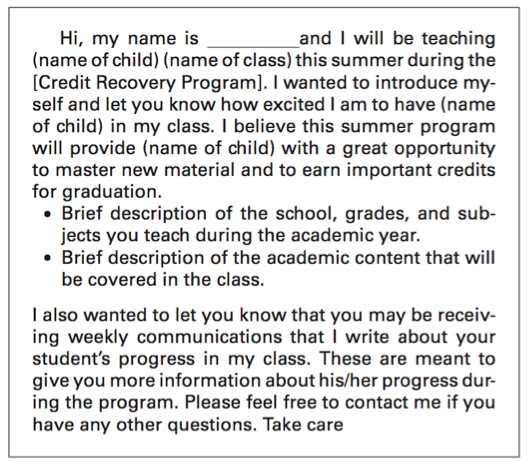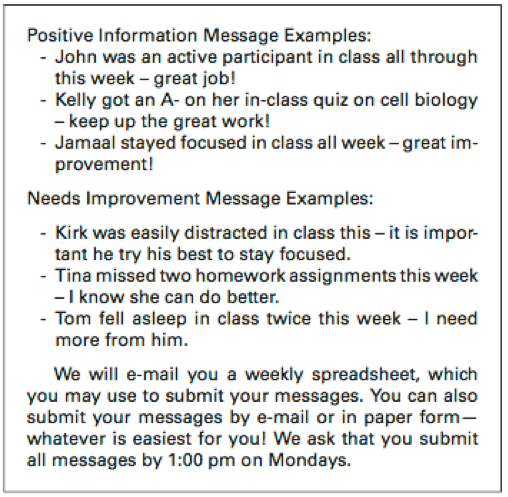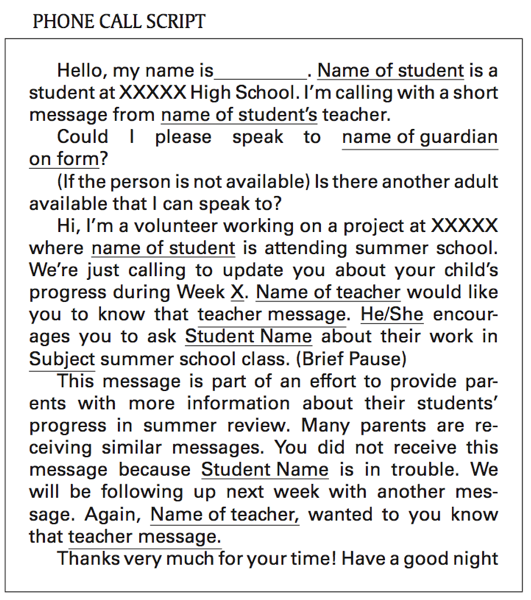
The Underutilized Potential of Teacher-Parent Communication
Organization : Harvard Kennedy School
Project Overview
Project Summary
Teachers in a summer school program for high school students provided brief, individualized, messages for parents with information about their child’s performance and behavior in school on a weekly basis.
Impact
Providing parents with individualized messages increased the probability a student earned credit for each class by 6.5 percentage points – a 41% reduction in failure rates.
Cost
~$13 per student
Challenge
Past research indicates there is a positive relationship between parental involvement and students’ success in school, but communication between educators and parents is often infrequent or unsystematic. This project’s goal was to increase the number of high-school students passing a summer credit recovery program by bolstering parents’ efforts and effectiveness at supporting their child’s success in a high school credit recovery program.
Design
Over the course of the 5-week program, parents of high school students enrolled in a summer credit recovery program received an introductory phone call from their child’s teacher, followed by a series of four brief, individualized messages. The messages, composed by their child’s teacher, were delivered via phone call, text, or email, and were translated if necessary according to the communication and language preferences indicated by parents during initial project enrollment. The messages provided either “positive” information, highlighting what their student was doing well, or “improvement” information, highlighting specifically what their student needed to improve.
The summer credit recovery program enrolled students from over 30 high schools in the district across all four high school grades, the vast majority of whom were African-American and Hispanic, 58% and 32% respectively. Over 80% were eligible for free or reduced-price lunch and 22% participated in special education programs. Given the nature of the program, enrolled students had notably lower levels of academic achievement and engagement in school than typical students in the district. On average, students were absent from school 13% of the school year in 2011/12 and had failed more than one class. 435 students were randomly assigned to one of three groups: no messages, positive messages, or improvement messages.
Below is the script given to teachers for the introductory phone call to parents:

Below are example messages of “positive” and “improvement” messages, along with the instruction provided to the teachers. It is followed by the phone and email scripts used by the researchers delivering the messages.



Impact
This randomized evaluation found that sending parents messages about their child’s academic performance and behavior increased the probability that a student passed their course by 6.5 percentage points. Furthermore, messages containing improvement information, as opposed to positive information, seemed to have a larger effect, increasing the probability that a student earned credit for each class they took by 8.8 percentage points, although the difference between the two types of messages is not statistically significant. The impact did not vary by gender, age-group, race, English proficiency level, enrollment in free or reduced lunch or number of courses failed.
The increased probability of course credit recovery for students whose parents had received a message was largely driven by a decrease in dropout rates (of 6.1 percentage points), rather than by a reduction in failure or dismissal rates.
Sending messages to parents about their child’s academic performance and behavior also had a positive effect on student attendance, decreasing absenteeism by 2.5 percentage points from 12% to 9.5%.
In addition, students of parents who received the text messages were 8.9 percentage points more likely to report their parent “almost always” spoke to them about doing better.

Note: the effect for sending positive messages to parents is not statistically significant
Implementation Guidelines
Inspired to implement this design in your own work? Here are some things to think about before you get started:
- Are the behavioral drivers to the problem you are trying to solve similar to the ones described in the challenge section of this project?
- Is it feasible to adapt the design to address your problem?
- Could there be structural barriers at play that might keep the design from having the desired effect?
- Finally, we encourage you to make sure you monitor, test and take steps to iterate on designs often when either adapting them to a new context or scaling up to make sure they’re effective.
Additionally, factors that are especially important to implementing the intervention effectively include:
- Ask parents for their preferred method for delivering the message.
- Have the teachers themselves make the introductory phone call. It helps familiarize the parents and makes the text messages sent later feel more personal and the source more trusted.
- Send the messages frequently. In this intervention, they were sent on a weekly basis.
- Keep the messages short and concise.
- Make it easy for teachers to write the messages. Have someone else, besides the teachers, deliver the messages, and make sure the method used by teachers to record the weekly messages is easy and flexible, and based on teacher preferences. In this intervention, the teachers had to record their messages on an excel sheet that was emailed to them weekly, and they could submit the spreadsheets either by email or in print.
- Set deadlines, specifying the time and data by which the teachers must submit the messages.
- Highlight in the messages sent what the student needs to improve.
- Avoid broad comments or topics in the messages, mention specific instances.
- Provide in the messages a clear and specific prescription for what the student should stop doing, start doing, or continue doing to improve.


